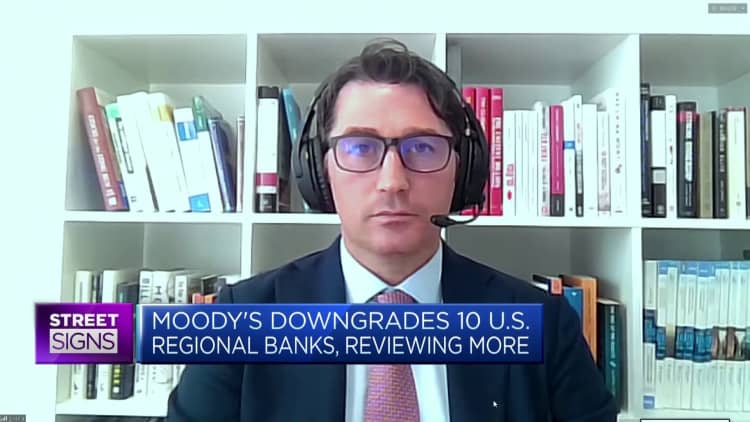A metalworker grinding a peace of metal is pictured in a forge in Klitten, Germany. Manufacturing activity has struggled this year.
Florian Gaertner | Photothek | Getty Images
Germany is set for a prolonged recession this year — the only major European economy to experience an economic contraction during 2023, according to fresh forecasts by the European Commission, the executive arm of the EU.
Europe’s largest economy is predicted to post a 0.4% fall in economic activity this year — that’s 0.6 percentage points lower than an estimate made in May, according to the commission, which published new forecasts on Monday. The institution also cut its growth expectations for Germany in 2024, from 1.4% to 1.1%.
The German economy has struggled in the wake of Russia’s invasion of Ukraine, with Berlin having to, very quickly, end years of energy dependency on the Kremlin. The International Monetary Fund said in July that Germany would likely contract by 0.3% this year.
Top economists have dubbed the traditional economic powerhouse as the “sick man of Europe.” The concept was coined back in 1998 when Germany faced deep economic challenges. But it’s now being resurfaced as Berlin registers deep declines in output.
Data released in early September showed manufacturing activity in the country fell at its strongest pace since June 2009, excluding the Covid-19 pandemic period.
Other economists, however, disagree that Germany’s current woes can be compared to previous downturns.
“Germany’s situation today differs crucially from the trouble of 1995-2004. First, Germany enjoys record employment, high demand for labour and the most comfortable fiscal position of all major advanced economies. That makes it much easier to adjust to shocks,” Holger Schmieding, chief economist at Berenberg, said in a note in August.
Overall slowdown in Europe
The latest economic forecasts point to a general slowdown across the region. The 27 EU economies are now expected to grow at an average pace of 0.8% this year. This is down from the 1% estimate made in May.
Going into next year, the picture is also more downbeat than previously forecast. The EU is expected to grow by 1.4% rather than the May estimate of 1.7%.
“Weakness in domestic demand, in particular consumption, shows that high and still increasing consumer prices for most goods and services are taking a heavier toll than expected,” the European Commission said in a statement Monday.
High inflation continues to be one of the main challenges in the bloc. The latest forecasts show that consumer prices will come down in the coming months, but they are still likely to be above the European Central Bank’s target of 2% by the end of 2024.
Headline inflation in the euro area, where 20 EU nations share the same currency, is seen at 5.6% in 2023 and then at 2.9% by the end of 2024.

“Inflation in services has so far been more persistent than previously expected, but it is set to continue moderating as demand softens under the impact of monetary policy tightening and a fading post-COVID boost,” the commission said.
It warned that price pressures might drag on for longer. The ECB is due to meet Thursday and announce whether it is raising interest rates again. The central bank has, since July 2022, increased rates by 4.25 percentage points in an attempt to bring down historically-high inflation in the region.

